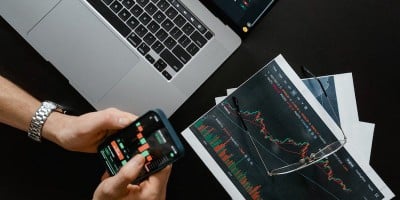An ETF is an investment security that operates similarly to a mutual fund. ETF often follows a certain index, commodity, sector, or other assets, and you can buy or sell ETFs on stock exchanges just like normal stocks can. An ETF can track everything from the cost of a single product to securities of a large and varied group. ETFs are designed to follow specific investment approaches.
The first ETF that monitors the S&'P 500 Index that is still actively traded today is the SPDR S&'P 500 ETF (SPY).
When you purchase shares of an ETF, you do not own a portion of the underlying securities or assets in contrast to holding stock in a company. To keep the price of the ETF in line with the value of the underlying index or assets, the financial services company that manages it modifies the number of exchange-traded fund's outstanding shares.
Types of ETFs

Investors have access to a variety of ETFs that they can use to manage risk in their portfolios, generate revenue, and engage in speculation and price growth. Here's a brief description of some of the types of ETFs that are available in the market.
Fixed Income ETFs: They offer exposure to almost all types of bonds available
Fixed Income ETFs: They offer exposure to nearly all types of bonds available, including corporate bonds, municipal bonds, US Treasury, overseas, high-yield, and several other bonds
Sector and industry ETFs: They are designed to give exposure to a particular industry, such as high technology, oil, or medicines industries.
Commodity ETFs: They track the price of commodities like corn, oil, or gold.
Style ETFs: They monitor the market's size and investment style focus, such as the small-cap growth of the market.
Foreign Markets ETFs: They track foreign markets, such as the Nikkei Index in Japan or the Hang Seng Index in Hong Kong
Inverse ETFs: They are designed to gain from a fall in the underlying market or index
Leveraged ETFs: They employ leverage to increase returns, leveraged ETFs
Actively managed ETFs: Unlike most ETFs, which are created to track an index, this one is intended to outperform it.
Alternative investment ETFs: Innovative frameworks, like ETFs, that give investors access to specific trading strategies, such as currency carrying or covered call writing, or allow them to trade volatility.
How to Invest in ETFs

You can buy ETFs in various ways, and your choice of method will largely depend on your preferences. ETF investment is only a few taps away for active traders. Although the quantity of these investments (and associated costs) offered by online brokers varies from broker to broker, these investments are a regular offering among them. One development that has benefited consumers of ETFs is that many major brokerages have reduced their commissions on trading ETFs, stocks, and options to $0.
Open the Broker Accounts: You'll need a brokerage account if you're ready to invest freely in ETFs. Your investments are kept in brokerage accounts, but just because you have an account doesn't guarantee you have any assets. You can invest in ETF from your new account after it has been created.
Choose the ETF you want to invest in: This is easier than it sounds, but because there are so many ETFs available, it might be challenging to select. You can use online stock screeners to select ETFs with minimal costs, funds in specific industries, or ETFs with a socially or environmentally conscious focus.
Buy an ETF: Browse to the specific ETF you want to buy using the trading feature of your brokerage, then execute the trade. Before making your order official, double-check it.
Keep the ETF: Your investment strategy will determine how long you keep an ETF, but if you're saving for retirement, it's frequently a long wait. Compound interest works in such a way that the longer you keep an ETF, the more your interest rate will continue to grow.
ETF Vs. Mutual Funds
ETFs are typically less expensive than mutual funds, which is a significant selling point.
ETFs are more tax-efficient than mutual funds as well. A mutual fund typically experiences more buying and selling than an ETF (particularly actively managed ETF), and this buying and selling may lead to capital gains. The manager will also need to sell securities to raise funds when investors want to sell mutual funds, which may result in capital gains. Investors will be responsible for those taxes in either case.
ETF Vs. Stocks
Although stocks comprise ETFs, there isn't any such thing as "ETF stocks." You can't buy stock in an ETF, but you can purchase shares of one. Individual stocks, equities, and other investments are the components of ETFs.
You can trade ETFs, like stocks, on exchanges, and they have distinctive ticker symbols that allow you to follow the fluctuation of their prices. ETFs represent a collection of stocks, as opposed to stocks representing a single company. Compared to a single stock, ETFs may offer better diversification because they incorporate a variety of assets. This diversification might aid in lowering the risk exposure of your portfolio.
Bottom Line
ETFs, offer a cost-effective method to introduce a small investment portfolio to a diverse range of securities. The investor can purchase shares of a fund that seeks a broad cross-section of the larger market instead of buying individual stocks. When investing in an ETF, there are certain additional costs to consider.